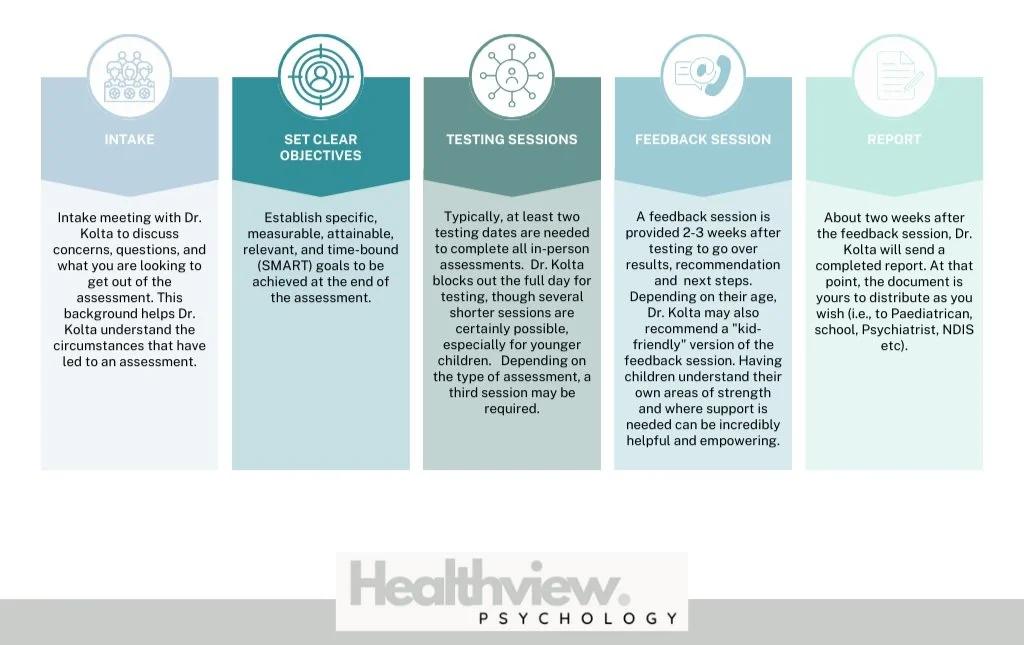
Cognitive Assessments
Intellectual Disability. Learning Disorders. Giftedness
A cognitive assessment is also known as an assessment of intelligence (IQ). Cognitive assessments are tools used to measure an individual's cognitive abilities, such as memory, attention, problem-solving, and reasoning skills. These assessments are designed to provide valuable insights into a person's cognitive functioning. They involve the series of standardised subtests that evaluate different aspects of cognition and how they process information. They also help identify strengths and weaknesses in cognitive functioning, diagnose cognitive impairments or disorders, or giftedness and guide appropriate interventions or treatments. By assessing cognitive abilities, these assessments contribute to a better understanding of an individual's cognitive profile and help make informed decisions about their cognitive health and wellbeing.
Assessment Tools
Tests used during the assessment process may include:
A range of screening checklists are also used as part of the assessment process to inform the results from formal testing. These are completed by parents/ guardians on the day of the assessment and sent to teachers (as appropriate).
Assessment Process

Assessment Process
The cognitive assessment process typically involves several steps designed to evaluate an individual's cognitive abilities comprehensively. Here is a general overview of what the process might look like:
Referral and Intake Assessment
The process begins with a referral, often from a healthcare professional, educator, or concerned parent/guardian or adult. An initial interview is conducted to gather relevant background information, such as developmental/medical history, educational background, and specific concerns or symptoms.
Set Objectives
Based on the individual's needs and the purpose of the assessment, the most appropriate cognitive assessment and subtests. There are various standardised assessments available, each targeting specific cognitive domains.
Testing Session(s)
The selected tests are administered. This may involve tasks such as memory tests, attention and concentration tasks, problem-solving exercises, and language assessments. The tests are usually conducted in a quiet and controlled environment to ensure accurate results. The length of time required for a cognitive assessment can vary depending on several factors, such as the chronological age of the individual, the complexity of the tests, the number of assessments administered. On average, a cognitive assessment session takes 90 minutes but can range from one to three hours. However, it's important to note that the duration can be shorter or longer depending on the specific circumstances and needs of the individual being assessed.
Feedback Session
After the tests are completed, the individual's performance will be scored based on established norms. This allows for a comparison of the individual's performance with that of a representative sample of the same chronological age. The scores are then interpreted to understand the individual's cognitive strengths and weaknesses.
Report
A detailed report summarising the assessment results will be provided 2 to 4 weeks after administration (provided all questionnaires are completed within a week of the assessment). This report includes the individual's performance on each test, an interpretation of the scores, and recommendations based on the findings. Depending on the results, the report may include recommendations for further assessment by other professionals such as behavioural optometrists, educational audiologists, paediatricians, occupational therapists and speech therapists. The report is shared with the individual, parents/guardians, and relevant professionals (as appropriate).
Follow Up and Intervention
If any cognitive impairments or areas of concern are identified, appropriate interventions or treatments may be recommended. This could include educational accommodations, therapy, or further evaluations by allied health specialists.
Note. It's important to note that the cognitive assessment process can vary depending on the purpose of the assessment, the age of the individual being assessed, and the specific tests used. Additionally, the process may involve collaboration between professionals from different disciplines to ensure a comprehensive evaluation and appropriate interventions.

